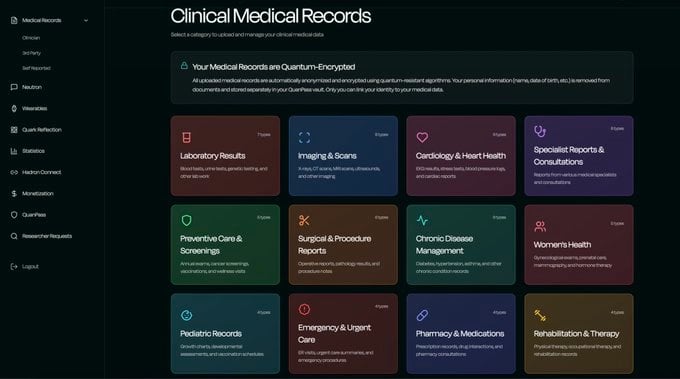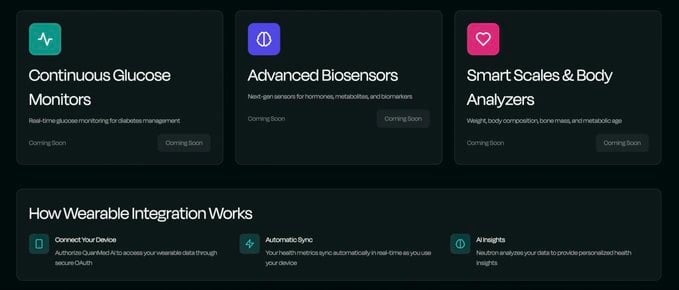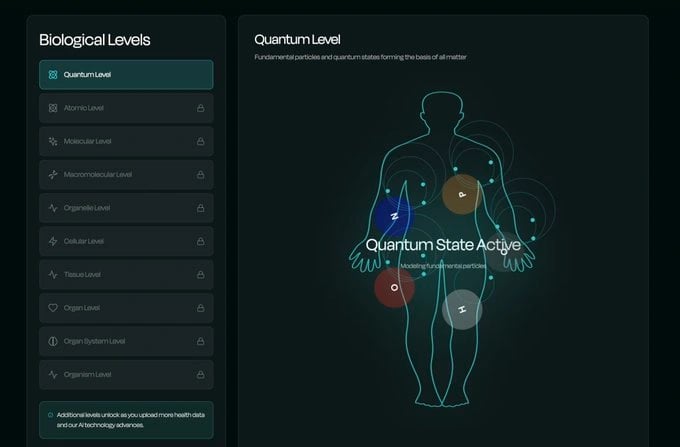위키 구독하기
Share wiki
Bookmark
QuanMed AI
QuanMed AI
QuanMed AI는 양자 역학, 인공 지능, 그리고 블록체인 기술을 통합하여 의학 연구와 임상 실습을 발전시키는 것을 목표로 하는 분산형 프레임워크입니다. 이는 생물학적 시스템에 대한 양자 정보 기반 이해로의 전환을 제안하여 개인 맞춤형 예측 의료 솔루션 개발을 가능하게 합니다. [8]
개요
QuanMed AI는 양자 원리를 복잡한 생물 시스템 분석에 통합하여 의료 혁신을 목표로 합니다. 거시적 및 생화학적 모델에 중점을 둔 기존 의료 접근 방식의 한계를 해결하기 위해서입니다. 분산 데이터 시스템, 고급 AI 및 양자 컴퓨팅을 활용하여 원자보다 작은 입자에서 전체 유기체 표현형에 이르기까지 다양한 규모의 의료 정보를 분석하여 더욱 정확하고 개인화되고 예측 가능한 의료 통찰력을 제공합니다. 이 플랫폼은 안전하고 익명화된 데이터 공유를 지원하며 연구원, 임상의 및 기술 전문가 간의 협업을 장려하여 혁신을 가속화합니다. 이 양자 정보 기반 프레임워크를 통해 QuanMed AI는 질병 이해를 발전시키고 치료법을 최적화하며 의료 연구를 민주화하고자 합니다. [1]

아키텍처
QuanMed AI 프레임워크는 의료 생태계 내 특정 기능을 다루도록 설계된 4개의 주요 연구소를 중심으로 구성됩니다. 이러한 연구소들의 통합을 통해 QuanMed AI는 의학 연구와 실무를 양자 정보 기반의 데이터 중심 패러다임으로 전환하는 포괄적인 시스템을 구축하는 것을 목표로 합니다. [2]
Lepton Lab
퀀텀메드(QuanMed)가 개발한 Lepton Lab은 의료 연구 및 건강 데이터 관리를 위한 분산형 인프라입니다. 블록체인 기술을 활용하여 사용자 제어 의료 기록을 안전하게 저장하고, 개인이 임상의 및 연구자에 대한 맞춤형 접근 권한을 지정할 수 있도록 합니다. 데이터는 세 가지 계층(제타(Zeta) - 기본 인구 통계 및 활력 징후, 에타(Eta) - 게놈 데이터 및 검사 결과와 같은 자세한 진단, 세타(Theta) - 특정 연구를 위한 맞춤형 데이터 수집)으로 분류되어 개인 정보를 보호하면서 다양한 분석 깊이를 지원합니다. 이 플랫폼은 암호화된 익명화, 임상의가 검증한 항목, 그리고 웨어러블 기기 또는 사용자 업로드를 통한 자가 보고 데이터를 결합하여 포괄적인 건강 프로필을 만듭니다. 임상의는 데이터 검증, 연구 참여, 그리고 AI 생성 통찰력을 활용한 환자 치료 개선에 기여합니다.
기존 의료 시스템의 상호 운용성 문제를 해결하기 위해 Lepton Lab에는 Hadron Connect API가 포함되어 있어 의료 제공자 간의 안전하고 즉각적인 데이터 전송이 가능합니다. 이 시스템은 제3자 및 사용자가 기여한 데이터를 포함한 구조화된 환자 기록을 통합하는 동시에 표준화된 형식, 감사 추적 및 역할 기반 접근 제어를 시행합니다. Hadron 내의 AI 도구는 환자의 전체 병력을 기반으로 진단 제안, 검사 프로토콜, 치료 권장 사항 및 약물 확인을 통해 전송된 데이터를 향상시킵니다. 이러한 기능들이 결합되어 윤리적으로 준수하고 연구에 적합한 데이터 세트를 생성하고 기관 간 임상 의사 결정을 향상시키는 현대적인 건강 데이터 교환을 목표로 합니다. [2]

선수
Lepton Lab의 연구는 두 대조군, 즉 엘리트 선수와 진단받은 의학적 상태를 가진 개인으로부터의 데이터 수집으로 시작됩니다. 이러한 전략은 데이터 프로필 간의 명확한 차이점을 분석할 때 가장 효과적인 GAN 및 VAE와 같은 머신 러닝 모델을 지원합니다. 진단된 질환은 최적이 아닌 건강 상태의 예를 제공하는 반면, 엘리트 선수는 최적의 생리적 성능에 대한 벤치마크를 제공합니다. 이러한 극단을 비교함으로써 시스템은 건강 결과와 관련된 주요 생물학적 요인을 식별할 수 있습니다.
엘리트 선수는 신체 컨디션, 유리한 유전적 특성 및 전신 생리적 균형을 기준으로 선발됩니다. 그들의 데이터는 여러 신체 시스템이 최고 성능으로 기능하는 방식에 대한 통찰력을 제공합니다. 의학적 상태를 가진 개인은 의료 파트너십을 통해 모집되고, 선수는 후원 및 소셜 네트워크를 통해 참여합니다. 이러한 결합된 데이터 세트는 다양한 건강 상태를 감지, 예방 및 치료를 안내하는 것을 목표로 하는 AI 모델 개발을 지원합니다. [2]
양자의학 저널 (Quantum Medicine Journal)
양자의학 저널(Quantum Medicine Journal)은 블록체인 기반의 동료 심사 학술지로, 의학 연구에서 양자 접근 방식을 발전시키는 데 중점을 둡니다. QuanMed AI 생태계 내에서 양자 의학을 과학 분야로 공식화하고, 연구 결과를 보급하며, 커뮤니티 참여를 촉진하고, $QMD 토큰을 통해 기여자에게 토큰 기반 인센티브를 제공하는 등 여러 기능을 수행합니다.
주요 특징으로는 양자 관련 가설에 대한 엄격한 초점, 관련 전문 지식을 갖춘 커뮤니티 선정 동료 심사자, $QMD 토큰으로 심사자에게 보상하는 것을 포함합니다. 제출 날짜, 심사 이력, 버전 변경 사항과 같은 모든 출판 기록은 블록체인에 저장되어 투명성과 위변조 방지 문서화를 보장합니다. 이 모델은 학문적 표준과 분산 기술을 결합하여 경제적 인센티브를 지식 생산과 일치시킵니다. [2]
프로톤 랩 (Proton Lab)
프로톤 랩은 QuanMed AI 생태계 내의 주요 데이터 분석 단위로서, 통계 모델, 컴퓨팅 도구 및 기계 학습을 사용하여 분산된 의료 데이터를 처리합니다. 익명화된 블록체인 기반 건강 기록에 대한 공개 접근을 제공하여 기술 전문가들이 기존 연구에서는 일반적으로 볼 수 없는 새로운 패턴과 상관 관계를 발견하기 위해 고급 방법을 적용할 수 있도록 합니다.
랩의 분석 프레임워크에는 공개 데이터 접근, 패턴 인식 도구 및 구조화된 통찰력을 연구자 또는 제약 회사에 판매할 수 있는 상용화 경로가 포함됩니다. 이 모델은 AI, 양자 컴퓨팅 및 복잡한 시스템과 같은 분야의 다학제적 참여자들을 유치하여 의료 문제에 대한 혁신적인 접근 방식을 제공하고, 그에 따라 의료 데이터 분석에서 더 빠른 발견과 더 광범위한 참여를 촉진합니다. [3]
GP 어시스턴트
GP 어시스턴트 프로젝트는 QuanMedAI가 개발한 고급 유사성 그래프 및 신경망 알고리즘을 활용하여 일반 의료 업계와 통합하도록 설계된 10개의 모듈을 만듭니다. 이러한 모듈은 의료 의사 결정 개선 및 여러 지역에서 권위 있는 약물 정보에 대한 접근을 간소화합니다.
처방 관행을 지원하기 위해 이 시스템에는 여러 국가에 맞게 조정된 기존 제약 참고 자료가 통합되어 있습니다. 여기에는 영국의 British National Formulary (BNF)(영국 약품집), 미국의 Physicians' Desk Reference (PDR)(미국 의사용 약품 안내서), 캐나다의 Compendium of Pharmaceuticals and Specialties (CPS)(캐나다 의약품 및 전문 약품 목록), 호주의 Australian Medicines Handbook (AMH)(호주 의약품 안내서)와 Therapeutic Guidelines (호주 치료 지침)이 포함됩니다. 뉴질랜드, 유럽 연합, 인도, 일본, 남아프리카 공화국 및 중국을 포함한 유사한 자료는 각 지역별 약물 모노그래프, 치료 프로토콜 및 처방 표준을 제공하여 정확하고 맥락에 맞는 의료 지침을 보장합니다. [3]
Fermion Lab
Fermion Lab은 의료 진단, 모델링 및 치료 시뮬레이션을 향상시키는 상호 연결된 네 가지 모듈을 통해 고급 데이터 합성에 중점을 둡니다. 중성자(Neutron) 모듈은 사용자 정의 가능한 개인 정보 설정에 따라 공유되는 환자 데이터를 사용하여 유사한 프로필과 비교하여 개인화된 진단 및 권장 사항을 제공하며, 구독 서비스로 운영됩니다.
전자(Electron) 모듈은 양자 역학 원리와 실제 데이터로부터의 기계 학습 개선을 사용하여 디지털 인간 모델을 생성하여 가상 실험을 통해 치료법을 최적화합니다. 글루온(Gluon) 모듈은 이러한 디지털 아바타에 대한 약리학적 및 절차적 개입을 시뮬레이션하여 치료 결과와 잠재적인 합병증을 예측합니다. Nucleus 및 Atom 모델에 의해 관리되는 광범위한 생체 측정 데이터 세트와 함께 이러한 구성 요소는 신경망을 통해 통합되어 표준화된 검사 및 로봇 수술과 같은 완전 자동화된 AI 지원 치료 프로세스를 지원합니다. [4]
전자 모델

전자 모델은 가장 작은 양자 규모부터 시작하여 여러 계층적 수준에 걸쳐 인간 생물학을 디지털 방식으로 매핑합니다. 양자 수준에서 입자 및 파동 기반 코드 구조를 통해 소립자와 그 상호 작용을 나타내는 수학 공식을 사용합니다. 이러한 상호 작용은 양성자, 중성자 및 전자를 포함하는 소립자 수준에서 발생하며 두 구조 모두에 의해 모델링됩니다.
위로 이동하면 모델은 수소와 산소와 같이 생명에 필수적인 원자를 디지털 방식으로 나타낸 다음 단순하고 복잡한 생체 분자(단백질 및 핵산 포함)를 형성하는 분자 상호 작용을 시뮬레이션합니다. DNA, RNA, 효소 및 구조 단백질과 같은 더 큰 생물학적 분자는 거대 분자 수준에서 매핑됩니다. 또한 모델은 핵과 미토콘드리아를 포함한 특수 세포 구조를 재구성하여 세포 기능의 실시간 시뮬레이션과 특정 세포 유형으로의 분화를 가능하게 합니다. 순환계와 신경계와 같은 조직, 기관 및 상호 연결된 기관계로 매핑을 확장하여 궁극적으로 고급 생의학 기술의 기반이 되는 완전히 기능적인 양자 매핑 디지털 인간 유기체를 생성합니다. [4]
보손 랩(Boson Lab)
보손 랩은 첨단 데이터 모델을 의료 절차 및 가정 의료에 적용하는 데 중점을 둡니다. 포톤(Photon) 모듈은 상세한 절차 데이터를 기반으로 실시간 정밀 의사 결정 지원을 제공하여 로봇 수술을 지원하며, 기술이 허용하는 한 원자 수준의 정확도를 가능하게 합니다.
베리온(Baryon) 모듈은 신속한 생체 인식 스캔 및 체액 분석을 통해 가정 의료를 자동화하여 매일 건강 모니터링 및 즉각적인 검사 결과를 제공합니다. 이러한 지속적인 데이터 수집은 조기 증상 감지 및 지속적인 건강 관리에 도움이 되어 기존의 정기적인 의사 방문보다 더 일관된 치료를 제공합니다. [5]
클라이언트 AI 에이전트
임상 AI 에이전트 플랫폼은 의료 AI 에이전트(AI agents)의 개발 및 배포를 지원하는 것을 목표로 하며, 인적 오류를 크게 줄일 수 있는 잠재력으로 인해 2035년까지 면허가 있는 임상 역할의 최대 80%를 대체할 것으로 예상됩니다. 이 플랫폼을 통해 AI 개발자는 블록체인(blockchain) 토큰과 $QMD 토큰을 페어링하여 가상 유동성 모델(정의된 토큰 공급 및 잠금된 유동성)을 사용하여 제품을 출시할 수 있습니다.
또한 기존 의료 AI 에이전트(AI agents)가 잠금된 $QMD 토큰을 구매하여 플랫폼에 상장될 수 있도록 지원합니다. 개발자는 신경망, 데이터 그래프 및 양자 및 영숫자 데이터 세트에 대한 API 엔드포인트를 제공하는 SDK에 액세스하여 QuanMed AI의 고급 의료 데이터 인프라와 통합할 수 있습니다. [5]
QMD
QMD 토큰은 QuanMedAI의 탈중앙화 생태계 내에서 기본 자산 역할을 하며 여러 기능 전반에서 가치 교환을 가능하게 합니다. 분석 서비스 이용권 구매, 의료 데이터 기여에 대한 인센티브 제공, 플랫폼 거버넌스 참여에 사용됩니다. 거버넌스는 간소화된 DAO 구조를 통해 관리되며, 프로젝트 초기 단계에서 임상의 검증, 데이터 제공자 승인 및 분쟁 사용자 등록을 감독합니다.
토큰 배포 모델은 공정하고 탈중앙화된 할당을 강조하며, 고정된 2억 개 토큰 공급량의 대부분 또는 전부가 프로젝트 출시 시 배포될 예정입니다. QMD는 기존 인프라와의 호환성 및 잠재적인 거래소 상장을 지원하기 위해 ERC-20 토큰으로 발행됩니다. 스마트 계약 개발은 진행 중이며, Rust가 주요 프로그래밍 언어로 사용되고 있으며, 향후 양자 저항성 또는 내부 체인과의 상호 운용성을 통해 더 넓은 기능을 계획하고 있습니다. [7]
잘못된 내용이 있나요?
